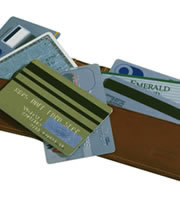Protect Credit Card and Other Financial Information with Strong Passwords

To protect your credit card and other personal information online, take care when choosing passwords, whether you’re setting up online access to your credit card statement or a shopping account on your favorite store’s Web site.
Poorly chosen passwords make information vulnerable to hackers, whose maddening ingenuity seems to only get better with each new step forward in technology.
Guarding Your Credit Cards
Follow these tips to make your password tough to crack:
• Make it complex.
The best password includes letters (lowercase and capitals), punctuation, symbols, and numbers. Your dog’s name or your favorite hobby, or any real word in any language for that matter, are easy passwords to crack–even if they’re spelled backward. Special software programs can be programmed to stage “dictionary attacks” to guess such ill-chosen passwords.
Your birthdate, driver’s license number, or other personal number are also poor choices. Avoid sequential or repeated numbers, such as 2222 or 12345, and letters in a row on the keyboard, such as asdfg.
• Make it long.
Use as many characters as you can. Longer passwords are tougher to crack than short passwords because there are more characters to guess.
• Test it.
Use an online password security checker to gauge the safety of your password.
A Good Password Is Key to Online Credit Card Security
• Keep it secret.
That sounds like a no-brainer, but many a password has been stolen from a post-it note left on a bulletin board or an unprotected document on a laptop computer. If you write it down, store the password in a secure place.
• Make it memorable.
One unique method is to write out a sentence or two and use the first letter of each word. Then add numbers and punctuation, and make some of the letters uppercase.
The U.S. Computer Emergency Readiness Team offers this example: Instead of the password “hoops,” you could use “IlTpbb” for “[I] [l]ike [T]o [p]lay [b]asket[b]all.” Then make it more complex by adding numbers and special characters, such as “Il!2pBb.” Avoid using famous quotations, common phrases or song lyrics, the team advises.
• Use different passwords for different sites.
After you create a strong password, it’s tempting to use it again and again. It’s tough, after all, to keep track of umpteen different passwords. But experts advise using a different password for each site. PC Magazine recommends getting password manager software, which generates strong passwords for you and manages logins so you don’t have to keep track and remember them all.
Disclaimer:The information in this article is believed to be accurate as of the date it was written. Please keep in mind that credit card offers change frequently. Therefore, we cannot guarantee the accuracy of the information in this article. Reasonable efforts are made to maintain accurate information. See the online credit card application for full terms and conditions on offers and rewards. Please verify all terms and conditions of any credit card prior to applying.
This content is not provided by any company mentioned in this article. Any opinions, analyses, reviews or recommendations expressed here are those of the author’s alone, and have not been reviewed, approved or otherwise endorsed by any such company. CardRatings.com does not review every company or every offer available on the market.
Published (Modified )